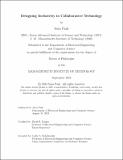Designing Inclusivity in Collaborative Technology
Author(s)
Park, Soya
DownloadThesis PDF (33.19Mb)
Advisor
Karger, David R.
Terms of use
Metadata
Show full item recordAbstract
Are Collaborative Tools Effective for Low-Status Workers? My thesis aims to provide answers to this question. Prior research in social science and organizational science argues that collaborative tools should be effective since technology reflects the social values of its users, and users will adapt the technology they use to make it effective for their needs. What I have found is that low-status users are not utilizing collaborative tools as much due to social burdens. I endeavor to comprehend why such a disconnect exists and to design systems that facilitate collaboration across different status levels.
My focus is on designing inclusive collaborative technology that caters to users of all statuses. I will refer to this as "status-aware interfaces." Instead of leaving low-status workers to navigate tools primarily designed for high-status individuals, I aim to provide assistance tailored to their unique challenges, making collaborative technology effective for low-status workers as well.
This dissertation develops these ideas through three systems: TaskLight, CollaboRanger, and Who2chat, each of which results in specific design implications for creating status-aware interfaces.
TaskLight enables low-status individuals to take on coordination work during collaboration, thereby allowing them to gain improved agency. CollaboRanger allows participants from different status dynamics who embrace different norms to bridge gaps and resolve conflicts. Who2chat uses nudges and enables social signaling to reduce social anxiety for low-status individuals interacting with users with higher status.
My work suggests that existing collaborative systems are indeed not effective for low-status individuals and should be redesigned to meet their social needs. These implications are even more relevant in the era of the future of work, where society becomes more distributed, and job markets swiftly change, leading low-status individuals to be more isolated and perplexed. Designing effective systems for low-status workers will ensure that technology is inclusive and supports those who are sometimes not heard or cared for.
Date issued
2023-09Department
Massachusetts Institute of Technology. Department of Electrical Engineering and Computer SciencePublisher
Massachusetts Institute of Technology